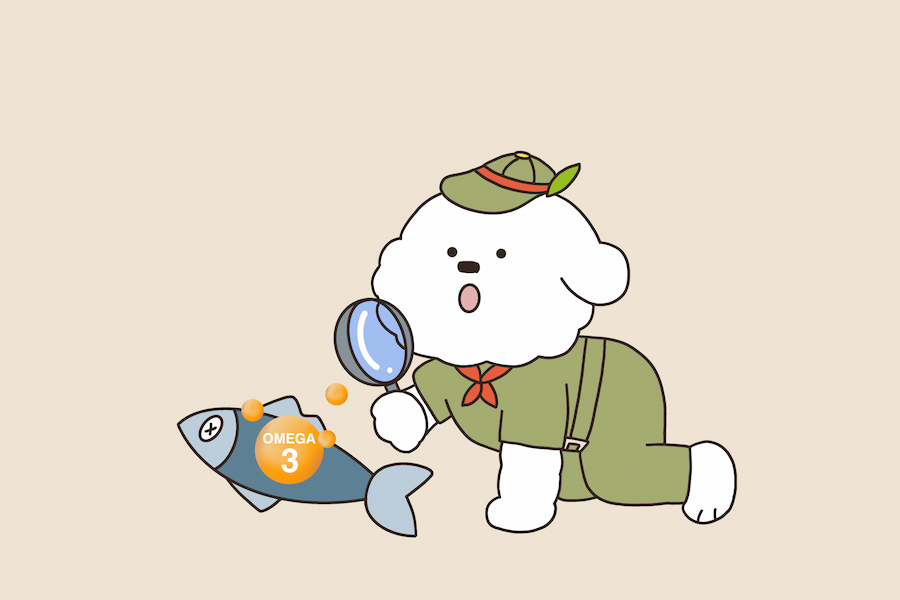Your dog needs nutrients to be at its best, just like you do. Omega 3 for dogs is one such nutrient that is vital to their diet. Not only has research demonstrated the importance of this for humans, but it has also demonstrated how crucial it is for your dog.
Dog owners frequently shower their pets with toys, treats, and stylish apparel but don’t overlook the more necessities, like daily food. Let’s find out the benefits, sources, side effects, dog foods with omega 3 fatty acids, and best omega 3 treats for dogs.

What Is Omega 3?
Fat is a necessary ingredient for dogs’ or humans’ diets. But fats can be classified as good or bad, and you and your dog should be eating more of the good kind.
Omega-3 fatty acids belong to a type of fatty acids known as polyunsaturated essential fatty acids, and they are healthy fats. Don’t worry; we’ll quickly review everything; it’s not as complicated and scientific as it seems. Here’s an overview of what the term means:
- Polyunsaturated fats are a type of good fat that is essential to the happiness and well-being of your dog.
- The phrase “essential” basically means that your dog must consume these fatty acids through food or omega 3 supplement for dogs because their body is unable to create them on its own.
- Finally, fatty acids are essential to overall health. They help the body store energy, absorb vitamins, and control hormones. Even though they are referred to as “fatty,” they won’t make your dog gain weight.
You need to make sure that your dog is eating food that contains a high-quality supply of omega-3. Omega-3 and omega-6 function together to balance each other out; therefore, your dog’s meals also need to include a healthy quantity of omega-6.
Benefits of Omega 3 for Dogs
Our four-legged pals enjoy numerous health benefits from omega-3 fatty acids. These important nutrients are an integral element of a balanced diet for dogs, helping to maintain healthy skin and joints as well as a glossy coat. Here are some omega-3 benefits for dogs:
Supporting Brain Development of Puppies
Puppies fed food containing high amounts of omega-3 fatty acids rich in DHA performed better in various tasks than puppies with a low omega-3 diet. The tests the young dogs performed in this study included the visual differentiation of objects, memory, balance, and coordination tasks.
Aiding Dogs with Arthritis by Reducing Inflammation
Numerous studies have demonstrated the potential role omega-3 fatty acids (high in EPA and DHA) can have in managing canine arthritis. Dog owners who participated in some research attested that adding omega-3 fats to their pets’ diets considerably decreased joint severity, lameness, and discomfort.
Enhancing Dogs’ Capacity for Fighting Cancer
Research has demonstrated that omega-3 fatty acids may prevent or at least delay the growth and spread of some types of cancer. This impact has also been verified in another study with thirty-two lymphoma-ridden dogs. By adding omega-3 fatty acids rich in EPA and DHA to their diet, they could prolong their survival periods and enhance their intervals free from sickness.
Helping Immune System of Dogs
Studies have indicated that including omega-3 fatty acids, which are high in EPA and DHA, in a dog’s diet has a beneficial effect on the immune system. Results have included everything from significantly increased antibody titers following vaccinations to reducing the harmful impacts of allergies brought on by an overreactive immune response.
Improving the Heart Health of Dogs
Numerous studies with dogs of various breeds, ages, sizes, and weights have demonstrated the significant benefits of omega-3 for dogs with different heart diseases. The benefits include decreased blood pressure, inflammation, and muscle loss, as well as enhanced heart health and hunger.

Consequently, compared to pups that did not get omega-3 fatty acids, those canines reported higher survival durations.
Enhancing Well-Being of Dogs Affected by Chronic Kidney Disease
Dogs with chronic kidney illness can benefit greatly from omega-3 fatty acids, which are high in EPA and DHA. However, the pups’ conditions considerably worsen when fed omega-6-rich vegetable oils like safflower, according to the same study.
Helping your Dog Maintain Healthy Eyes for a Long Time
Omega-3 fatty acids are very helpful for your dog maintain healthy eyes for a long time. In particular, Omega-3 fatty acids prevent dry eye by promoting tear production to keep the eyes moist. They help prevent macular degeneration, which can cause vision loss as dogs age. They also play an important role in protecting vision by helping the retina function properly.

Best Dog Food with Omega 3
Giving your pet a diet high in omega-3 fatty acids is essential for their health. Here are some natural foods that you can give your dog for Omega 3.
Dried Pollock
Dried Pollock is a great option for dogs because it’s a natural and healthy source of omega-3 fatty acids. Rich in EPA and DHA, vital for healthy skin, a glossy coat, and general well-being, this treat is ideal for dogs.
As Pollock has a low mercury content, it’s a healthy and safe treat for your pet. Dried Pollock is a tasty and practical way to provide important omega-3 fatty acids to your dog’s diet, boosting their immune system, cognitive function, and joint health. It is also easy to digest and full of protein.

Lee&Pol offers the best treats for your dog’s health by combining omega-3-rich, nutritious dried pollock with freeze-dried fruits and vegetables.
Strawberries
Strawberries contain small amounts of the Omega 3 fatty acid alpha-linolenic acid (ALA). The ALA in strawberries provides anti-inflammatory benefits. Strawberries are also an excellent source of vitamin C, which works synergistically with the Omega 3s by reducing oxidative stress. The vitamins B1, B6, and K in strawberries provide additional nutrients that support a dog’s overall health when combined with the beneficial Omega 3 fatty acids. Just be sure to remove the green tops and thoroughly rinse strawberries before feeding them to dogs.
Flaxseeds
Flaxseeds are a valuable addition to a dog’s diet due to their high content of alpha-linolenic acid (ALA), a type of Omega-3 fatty acid. Omega-3s are essential for maintaining healthy skin and coat, reducing inflammation, and supporting cardiovascular health. Flaxseeds also contain lignans and omega 6 fatty acid, which have antioxidant properties, and fiber, which aids indigestion. And flaxseed provides Omega 3s without any fishy odors some dogs dislike. It’s easy to make at home by grinding whole flaxseeds or can be purchased pre-ground. Adding ground flaxseed to homemade dog treats boosts their Omega 3 content.
Walnuts
Walnuts are a nutritious snack for dogs, offering a plant-based source of alpha-linolenic acid (ALA), a type of Omega-3 fatty acid. Omega-3s are crucial for maintaining healthy skin and coat, reducing inflammation, and supporting overall cardiovascular health. Additionally, walnuts contain antioxidants, protein, and vitamins such as vitamin E, which contribute to a dog’s overall well-being.
Sardines And Anchovies
Sardines and anchovies are little fish that are extremely beneficial to dogs’ health. High quantities of beneficial Omega-3 fatty acids, such as eicosapentaenoic acid (EPA) and docosahexaenoic acid (DHA), are found in these fish and can enhance the health of your dog’s heart, brain, and joints(such as patella luxation) in addition to improving the quality and condition of their coat and skin.
Chia Seeds
Packed with fiber, protein, antioxidants, calcium, magnesium, iron, B vitamins, and Omega-3 fatty acids, chia seeds are a nutritional powerhouse. Chia seeds strengthen your dog’s immune system, promote healthy skin and hair, support digestive and joint health, and help control blood sugar and insulin production.
How Much Omega 3 Can I Give My Dog?
The suggested daily dosage of omega 3 is 75 to 100 mg of EPA and DHA per kg of your dog’s weight. Be careful not to exceed the recommended dosage. Overdosing your dog’s prescribed medication can result in weight gain, diarrhea, vomiting, a weakened immune system, and other problems.
To convert their weight from pounds to kilograms, divide their weight in pounds by 2.2. For example, dividing 50 pounds by 2.2 yields the weight of your dog as 22.7 kilograms.
For example, if a regular liquid fish oil supplement is utilized, the average 50-pound dog would fall into the 1,702 mg to 2,270 mg goal range for EPA/DHA diet inclusion.
How to Give Dog Omega 3?
Your dog can obtain omega-3 fatty acids more quickly and conveniently by eating foods high in EPA and DHA. There are numerous methods for giving your dog healthy omega-3 fatty acids, including:
- Omega-3 supplements: Look for omega-3 supplements made especially for dogs that include fish oil or other marine sources high in EPA and DHA. These are frequently offered as tablets or liquids.
- Omega-3-infused dog treats: Dried pollock, salmon or other fatty fish are among the components used to make these treats, which are now available from several dog treat brands.
- Omega-3-rich dog food: A few premium dog foods feature extra omega-3 oils or use fish, such as salmon, as their main source of protein.

Lee&Pol’s dried pollock treats, with their variety of flavors and crunchy texture, are an excellent way for your dog to take omega 3!
Can Too Much Omega-3 Be Harmful to Dogs?
Yes, dogs may have negative effects from excessive omega 3. Although dogs require omega-3 fatty acids for several health reasons, including promoting healthy skin, lowering inflammation, and enhancing heart and brain function, taking too much of them might have unfavorable side effects.
Side Effects of Omega-3 for Dogs
Dogs who receive excessive omega-3 fatty acid supplements run the following possible risks:
- Digestive Problems: Excessive omega-3 intake may result in upset stomach symptoms, such as vomiting, diarrhea, and a fishy smell to the breath or skin.
- Blood Clotting Problems: Omega-3 fatty acids may thin the blood. Excessive amounts, particularly during surgery or after an injury, may interfere with normal blood clotting and increase the risk of bleeding.
- Immune Function Suppression: Excessive omega-3 ingestion may weaken the immune system, leaving dogs more prone to illness.
- Weight Gain: Since omega-3 supplements are frequently oil-based, taking too much of them may raise calorie consumption and, if not adequately managed, result in weight gain and obesity.
- Vitamin E Deficiency: Excessive intake of omega-3 fatty acids can cause the body’s vitamin E levels to drop, which might result in a deficiency. Lack of vitamin E, an essential antioxidant, can lead to many health problems, such as weakening muscles.

It’s critical that you stick to the recommended dosage to reduce these hazards. The size, age, health, and kind of omega-3 supplement used by the dog can all affect the precise dosage.
Frequent blood tests and veterinarian examinations can assist keep an eye on the dog’s health and guarantee that the omega-3 levels stay balanced.
Conclusion
One of the easiest and best methods to boost your dog’s overall well-being and health is to include omega-3 fatty acids in their diet. A sufficient supply of these healthy nutrients may do wonders, whether through delicious treats and supplements or premium dog diets enhanced with omega-3s.
Omega-3s are highly effective at improving the condition of the skin and coat, lowering inflammation, and promoting healthy brain development in puppies. Even though taking too much could be problematic, your pet can benefit safely if you stick to your veterinarian’s dose recommendations. Thus, include omega-3s in your dog’s diet to show them additional love—their wags will say it all!
FAQ
Yes, Omega-3 fatty acids are essential for your pup’s overall health. These beneficial fats support everything from a shiny coat and healthy skin to cognitive function and joint mobility. Incorporating omega-3s into your dog’s diet can provide a wealth of advantages.
No, while omega-3 supplements are beneficial for both humans and dogs, it’s best to stick with products specifically formulated for your furry friend. Human supplements may contain ingredients or dosages unsuitable for canine consumption, so opt for pet-friendly options to ensure safety and effectiveness.
Yes, you can give your dog omega-3 supplements daily, following the recommended dosage on the product label. These fatty acids are generally well-tolerated and can provide ongoing support for your dog’s health when consumed regularly as part of a balanced diet.
Yes, Omega-3 fatty acids are known to promote healthy skin and coat in dogs, which can help reduce excessive shedding. By nourishing the skin and fur from the inside out, omega-3s can minimize shedding and keep your dog’s coat looking its best.
Yes, dogs require omega-3 fatty acids as part of a balanced and nutritious diet. These essential fats play crucial roles in various bodily functions, from brain development to inflammatory response, making them an important part of your pup’s overall well-being.
There are several ways to incorporate omega-3s into your dog’s diet. You can opt for high-quality dog foods enriched with these fatty acids, offer omega-3 treats such as dried Pollock as a tasty supplement, or provide fish oil supplements specifically formulated for canine consumption.
Yes, omega-3 fatty acids are incredibly beneficial for dogs. These essential fats offer many advantages, including promoting healthy skin and coat, reducing inflammation, supporting cognitive function, and contributing to overall well-being. Incorporating omega-3s into your pup’s diet is a wise choice.
Omega-3 fatty acids offer numerous benefits for dogs. They support healthy skin and coat by nourishing from the inside out, reducing inflammation, and promoting joint mobility. Additionally, omega-3s contribute to brain development, cognitive function, and overall well-being in our furry companions.



